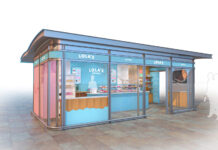Retail parks in the UK are currently experiencing their lowest space availability in over 15 years, as highlighted by recent CoStar data. This trend is driven by robust demand from retailers seeking out-of-town locations, characterized by steady foot traffic, ample parking, and the opportunity to acquire large, adaptable stores at competitive rents.
Currently, just over 3 million square feet of space is available across UK retail parks, a significant reduction from the amount marketed two years ago. The diverse range of retailers targeting these areas includes discounters, budget supermarkets, and other retail giants.

In 2022, the demand for retail park locations intensified, with discounters such as B&M, the Range, and Home Bargains expanding actively. Budget supermarkets Aldi and Lidl also contributed to this trend, with Aldi recently leasing a 20,000 square foot store at the Pompey Centre in Southsea.
The shift in focus isn’t limited to discounters. M&S, for example, has pivoted from high streets to more accessible retail parks, a move that’s been cited as a key factor in its recent success. This year, M&S committed to a 70,000 square foot store at Gallagher Retail Park in Dundee and is planning to relocate from its site in Blackburn town centre to a new retail park.
Leisure operators are also embracing retail parks, with Ninja Warriors acquiring locations in areas such as Swansea and Walsall. Food and beverage retailers, including Taco Bell, Gregg’s, and Five Guys, have opened several sites, particularly in smaller retail parks.
Despite a slight cooling in demand in 2023 due to challenging consumer environments and rising business costs, the availability rate has stabilized. However, continued interest from a varied group of occupiers and limited new development suggest that low availability levels will persist in the near term, potentially leading landlords to increase rents in many areas.

Ben Grose, Head of Retail Leasing at British Land, remarked on the trend: “Retail Parks have emerged as the winning retail format, and this sector continues to deliver. We’ve seen strong demand from retailers who prefer the retail park format, because – the space is very affordable, they are highly accessible for consumers with ample free parking, and the stores are easily adaptable, which is an important feature for retailers who face challenges in remodelling stores on the high street and in shopping centres.”
Grose also noted the expanding diversity in occupiers, with traditional retailers like Primark at Teesside Park and Glasgow Fort, Hotel Chocolat at Nugent Orpington, and Zara at Glasgow Fort, alongside emerging interest from healthcare providers such as diagnostics centres, dentists, and beauty clinics. He concluded, “There is an entire market with a lot of growth.”

















